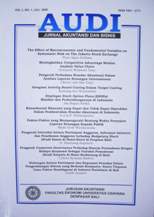KEINFORMATIFAN LABA DI PASAR OBLIGASI DAN SAHAM: UJI LIQUIDATION OPTION HYPOTHESIS
Abstract
Previous empirical research on informativeness of earnings has
focused on stockholders, and has not examined earnings informativeness
for stockholders and bondholders. Stockholders are residual claimants
and bondholders are fixed claimants, the informativeness of earnings
should differ for these two types of investors. When firm is financially
strong, earnings changes should be of limited relevance to bondholders,
but should be relevance to bondholders. In contrast, as the likelihood of
financial distress increase, stockholder’s limited liability allows them to
abandon the firm to bondholder and earnings change should be
increasingly important to bondholders and less important to shareholders
because earnings provide information on firm value. This suggest that the
effect of earnings to stock return should decrease as the firm’s financial
strength declines, while the effect of earnings to bond return should
increase. In contrast, when firm’s financial condition is strong, the effect of
earnings to stock return is higher than the effect of earnings to bond
return. We refer to this as the liquidation option hypothesis.
The objective of this study is to examine liquidation option
hypothesis. We use bond rating as financial condition’s measurement.
Consistent with our hypotheses, we find that the effect of unexpected
earnings to stock return is significant when firm is financially strong but
the effect of unexpected earnings to bond return is not significant. When
financial distress increase, the effect of unexpected earnings to stock
return is not significant but the effect of unexpected earnings to bond
return is significant




















